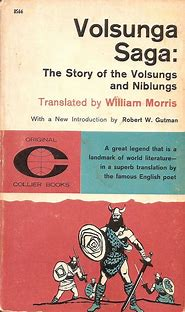Winnithar has a house built for Carl and Jorith. Carl keeps one room locked, never stays in it long and no longer visits Tiwaz's Shaw. Once, a wise-woman emerges from that room but cannot save Jorith when Dagobert is born. After Jorith's death, her father, Winnithar, burns the house as an offering to her. Dagobert leads sacrifices at the shrine where Carl decrees that only first fruits should be offered. (Something similar in The Corridors Of Time.) Apples cast into the fire become the Apples of Life... They do not but the Goths are essentially right to belief that Carl has eaten the Apples of Life.
West Goths have migrated to the Danube and the Roman frontier with possibilities of barter but also danger of war if the Romans resolve their civil conflict.
Geberic of the Greutungs becomes the first king of the East Goths, including the Teurings. Henceforth, they pay scot and attend the Great Moot. Geberic's son is Ermanaric.
"...a Roman lord hight Constantine..." (p. 383) unites the Empire.
(Great changes, not necessarily recognized as such.)
The East Goths defeat the Vandals who seek refuge in the Empire.
Dagobert leads the Teurings south.
Tribes are moving and the world is changing.

1 comment:
That's the beginning of the Volkerwanderung period.
Note the changes between then and the early-medieval period.
Eg., in 350 CE, Germanic-speakers stretch from the Rhine and North Sea coast all the way to central Poland, and from the North Sea in the northwest to the Ukraine in the southeast.
(There were a remnant of Gothic-speakers in the Crimea right into the 14th century, btw.)
Nobody had heard of the Slavs yet; they were probably in the Pripet Marshes.
Their northern neighbors, the Balts, lived all the way from the lower Vistula to around what's now Moscow.
So say Ermannaric's Goths -had- crushed the Huns.
The whole of northern, Central and Eastern Europe would be Germanic-speaking where it wasn't Baltic, everywhere north of the Danube at least, and if the Slavs existed at all they'd be a minor linguistic group, comparable to the Latvians/Lithuanians now.
Post a Comment